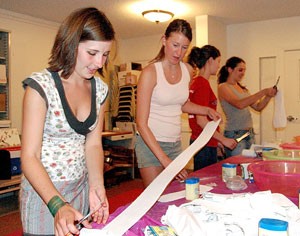More than 45 people gathered to celebrate and love being in their own skin last night.
The Women’s Studies Department and Southwest Institute for Research on Women held a “”Love Your Body”” event in the conference of the Social and Behavioral Sciences Annex.
“”‘Love Your Body’ is to help celebrate and love yourself in your own skin,”” said Katy Baker, a health and sexuality intern at the Women’s Resource center. “”It’s about being comfortable with who you are and in order to do that we have various activities and discussions set up.””
A panel discussion focused on how sexism and other pressures from society can lead people, specifically women, to have issues with their bodies.
“”I think that everyone, both female and male, feel pressure at some point from society about their body image,”” said Ayisha Al-Sayyad, a graduate student in women’s studies and a panelist who has done research in the area of body image and eating disorders in the lesbian community. “”I’m here to speak about how body image, gender and sexuality are related and I think it’s important because people often think that being a more masculine female means you don’t care about your image.””
According to the U.S. Department of Health and Human Service’s Office on Women’s Health, anywhere between 1 and 4 percent of the adolescent population in the United States suffers from a serious form of an eating disorder.
Eating disorders are also the third most common chronic illness amongst women.
“”Things like this really help and are important because they let people explore these current and real issues that people deal with on a daily basis,”” said Sara Demers, a Women’s Studies graduate student.
Baker agrees.
“”I think this is important because it raises awareness about some really important things,”” Baker said. “”People are talking about real things that have happened to them or that they have witnessed that deal with body image on the panel. It also is going to help show the institutional and social problems that can help lead to eating disorders and body image issues.””
Along with the panel discussion, participants were also entered in a raffle and encouraged to make breast molds.
“”The breast molds are just a way for everyone to come together,”” Baker said.
While the majority of those in attendance were women, men were not discouraged from attending.
“”Although this is aimed at women, we encouraged men to come too to see what women have gone through,”” Baker said.
Robert Portley, a political science senior, understands why these issues are important.
“”I am here because I am a SafeWalker and this is part of the job,”” Portley said. “”I do think it is a good idea to understand the theories and methods of thought about the subject, though. It affects a lot of people.””









